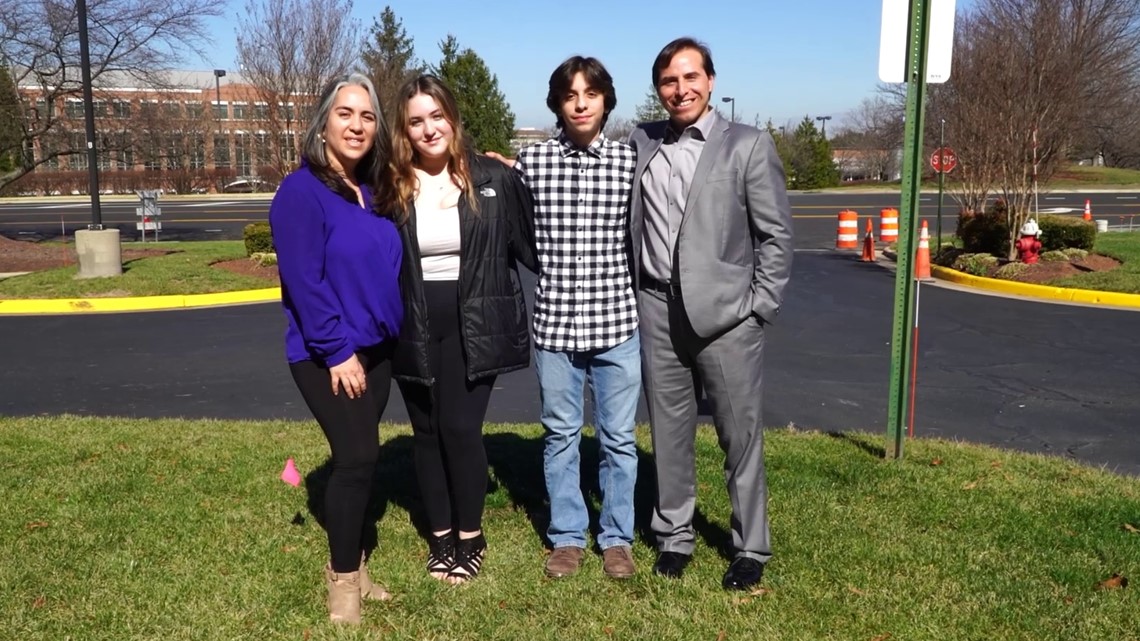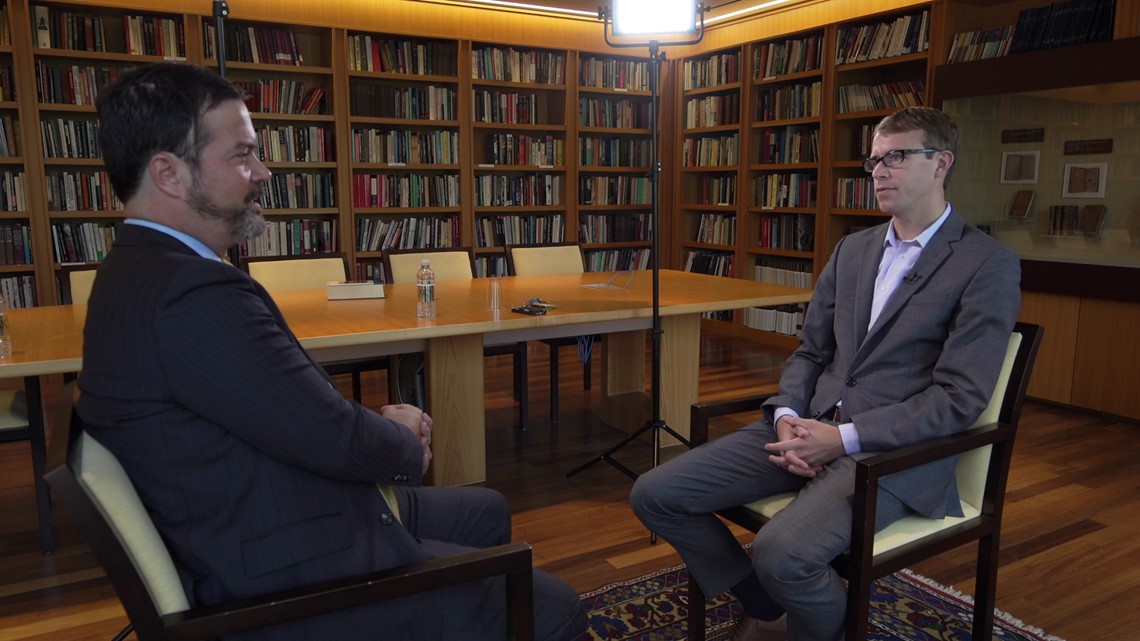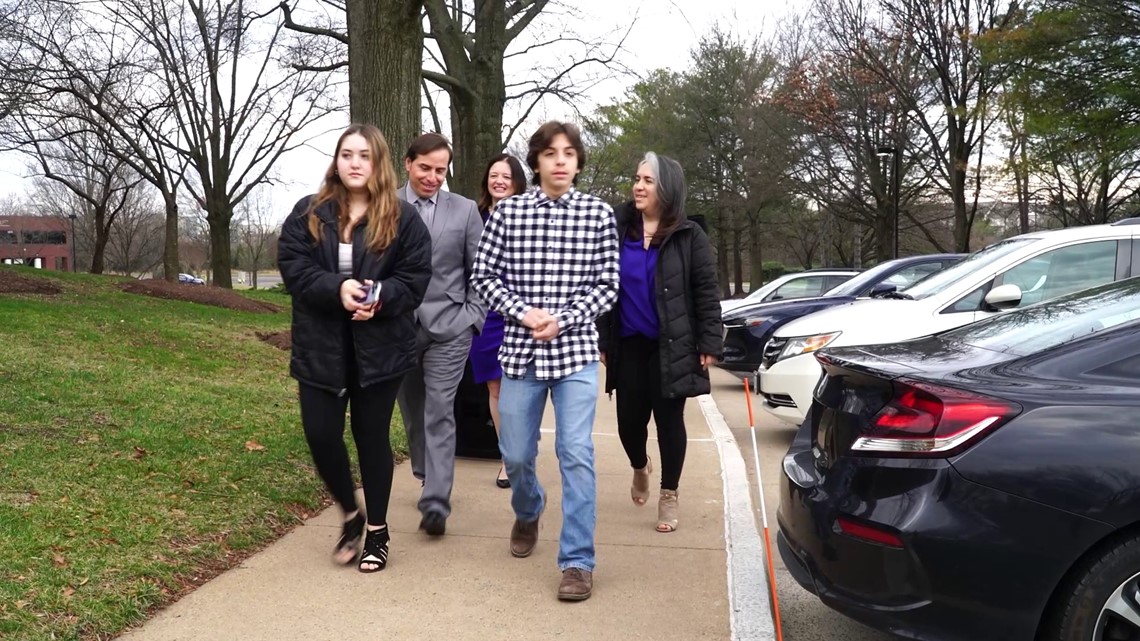Virginia has one of the longest backlogs of immigration and asylum cases in the country, according to court records.
WUSA9 Investigative Reporter Nathan Baca has covered Virginia's immigration courts for the past four years and digs into whether things have changed.
Winning The Right To Stay
Miguel Estramera entered the new immigration court in Sterling, Virginia on February 23. He was an undocumented immigrant arriving from Peru in 1998. But after marrying, having two children – all US citizens – and becoming a construction site safety inspector, it took him several years to get this court hearing.
"After so many years of being, waiting for status in U.S., I consider myself a citizen. Because so many years they've been in here, but I'm so happy now. So excited," said Estramera.
He was excited because he was granted the ability to stay, and not forced to return to Peru and leave his family.
"I feel very happy for him and will have a better future," said his teenage son Lucas.
"I feel very relieved and really happy to know that we can all stay here as a family together," replied his teenage daughter Mika.
Estramera's wife Carla said she is so happy.
"We finally get to have the peace that we're going to be finally living here," she said.


But as a sign of just how backlogged Virginia’s immigration courts are, despite winning his case, Estramera still can’t get a visa because of the limited numbers available.
"Each year, there's only 4,000 visas available for this type of application. And because we have so many new judges those visas are being taken a lot quicker than in the past," said Estramera's immigration attorney Eileen Blessinger.
The University of Syracuse tracks immigration court backlogs nationwide. As of January 2023, it places Virginia at the top of the list for the average number of days it takes for immigrants and asylum seekers to get a hearing: 1,106 days, or 3 years.
The majority of cases in Virginia involve immigrants from Central American nations, including Guatemala, Nicaragua, El Salvador and Honduras. In an attempt to clear the backlog, the federal court in Arlington was closed and two new courts were opened in Sterling and Annandale, Virginia.
Virginia Faces Court Backlog
But the latest federal numbers still show more than 71,308 pending immigrant removal cases between those two courts. Immigration attorneys tell WUSA9 of problems at the new courts including repeated video conference problems, lack of translators, and scheduling mistakes:
"The court should be communicating with attorneys before scheduling a date. Our office in particular actually has five trials on the same date, there's no way that I can be in five locations at the same time," said Blessinger.
"We recently had a case in which DHS filed an emergency motion to continue 1-2 days before the Immigration Hearing (IH) because they didn’t have the file. This was Sterling and the Immigration Judge (IJ) is at the Falls Church adjudication center. I ended up sharing the file with DHS so we could proceed. We didn’t finish that IH, and a second one is scheduled for this month. It was very stressful for us and the client. I did an Immigration Hearing at Annandale and later was informed that the audio recording was corrupted and so we have to completely redo the hearing. It’s as if it didn’t happen. Also, it was Webex and the IJ later told me he could only hear some of what was said because the audio was so bad in real-time. He almost made an adverse credibility finding that day, but no wonder if he only heard half of what we said," wrote one attorney wanting to remain unnamed due to pending cases with the court.
"I just got a call yesterday afternoon continuing tomorrow morning's hearing. Did not get a reason as to why, but I assume it was a lack of an interpreter. I have had to file emergency motions to continue for at least 10 cases due to court-created conflicts. The Notice of Hearing for many of those hearings did not arrive until a couple weeks before the hearing date. I have not received any pushback on those motions, though. Seems the court is liberally granting them. In Sterling I've had two cases that were continued due to the file not being there," said another attorney.
"I had a case back in January where DHS showed up and said that they did not have a physical file and asked for a continuance. This is a frustrating issue as it is a huge drain on resources to the client, the firm and to the court. In my experience, they gave us no advance notice of this request. They certainly could have filed a motion ahead of time or given us a call to warn us ahead of time. Of course, if I showed up at court and said the same excuse with this particular judge I'm sure I would have had a complaint filed by the judge against me and we would have been forced to move forward that day," wrote a third attorney.
In a statement, the Executive Office for Immigration Review (EOIR) wrote:
“EOIR adjudicators decide each case in a manner that is timely, impartial, and consistent with applicable law and case precedent, and consistent with due process. EOIR continues to manage its caseload as efficiently as possible. EOIR records do not indicate any marked increase in continuances for issues related to interpreters or technological issues.”
The statement continued, "when the Sterling Immigration Court opened, practitioners with cases assigned to those two courts began to experience more court-initiated continuances than would be typical due to a need to build the Sterling Immigration Court docket. Some rescheduling resulted in multiple hearings for the same attorney at the same time and EOIR worked with those attorneys to provide new hearing times. Those issues are resolved. Practitioners may motion the court on the rare occasion a reasonable caseload results in hearings scheduled for the same date and time."
Immigration attorneys tell WUSA9 the issues are not resolved as EOIR stated.
'We're Going To Kill You'
Then there’s the challenge of an immigrant proving asylum in the United States is the only way to avoid torture or murder in their home country.
"Now what persecutor in a country is going to hand them a letter and say, 'Hey, guys, if you come back, we're going to kill you.' Of course not. So they end up here with nothing but their testimony," said attorney Marc Seguinot.
Gerson Gonzales was a prison guard in Guatemala and says he witnessed government corruption. We interviewed him at his Manassas home in his native Spanish.
When asked if his life was in danger, Gonzales responded, “Yes, very much so. they tried killing me two times. They chased me. They threatened to kill me. Between the organized crime of narcotraffickers who were in bed with my country’s government, all about the corruption that happened in 2015.”
He applied for asylum in the United States in 2015, his attorney, Marc Seguinot said Gonzales followed all the rules and yet still had to wait seven years for a hearing, finally succeeding at getting asylum in the summer of 2022.
When asked if he was worried at the possibility of having to return to Guatemala, Gonzales said yes.
"I lived during seven years of which I was in constant battle. I lived day and night just thinking about what I would do if I had to live in Guatemala again," he said. "I have a beautiful family, two children. I said, although I wanted to do good for my country, I didn’t want to risk them. I spent days and nights asking God to help us.
That entire time in legal limbo, Gonzales and others in his position live a life of fear: fear of little to no legal protections, fear their asylum cases may fall apart when witnesses and sponsoring family members go missing or even die.
Advocates For Immigration Reform
Associate Director of Immigration Studies at D.C.'s Cato Institute David Bier says the situation is not improving.
"There are many other cases that the government deems a higher priority, where there's a criminal issue where they're seeking removal based on some violation of criminal law, those cases are always going to take priority over seeking removal of someone who has a compelling asylum claim," said Bier. "And so often, the more compelling the asylum claim, the lower priority, the courts place on trying to get that case to completion, because what they really want to focus on is removing the people who don't have a valid claim."


Bier added that the long wait times for employment authorization can keep people from being able to contribute to the county and cause localities to see them as a burden because they're not contributing to their fullest potential.
"Even after they eventually, you know, more than a year down the line, get that employment authorization document that allows them to work while their case goes through the process," he explained. "They're not investing in this country, they're not investing in homeownership. They're not investing in their skills, because they're not sure whether this will be their ultimate home or not. And that's a cost. It's a cost to assimilation. It's a cost to the economy because these workers are not fulfilling their highest productivity use of their time if they are not able to invest in their skills and invest in their future in this country."
Bier says the single most important thing that needs to happen is comprehensive immigration reform.
"We need a new immigration system to process people who are trying to come to the United States, we can't rely on asylum as the main way in which lower-skilled workers come into this country," Bier said. "We need a visa system that authorizes them to come contribute to this country, go back to their home country if they want, or stay here. Ultimately, that's the answer. And many people on Capitol Hill know that comprehensive reform is needed and is the answer. We've just been in a state of paralysis politically when it comes to coming up with that type of solution."


Meanwhile, Miguel Estramera says the United States has come to mean everything to him since arriving in 1998.
"I became Christian here. I knew Jesus coming to this country and a new opportunity for me to raise my kids in a better country more opportunities and raise them well and give him what I didn't have," he explained. "One thing that helped us a lot was believing in God through Christ. He gives us the strength to continue and continue and continue for so many years. What keeps us alive, is to have faith in God, and actually having a good lawyer."
.png)









 English (US) ·
English (US) ·